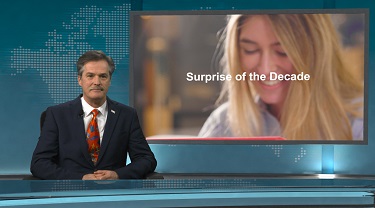This isn’t just my last commentary of the year; it’s the last of the decade. In my current role, I’ve only had one other opportunity to wrap up the decade this way, and the last time—well, we still had that Great Recession thing to deal with. That event wasn’t really the surprise back then; the head-turner was that it took the recession so long to come about. So, what was the great politico-economic surprise of the 2010s?
There is no lack of items to choose from. Natural disasters come quickly to mind. The decade opened with a devastating earthquake in Haiti. The following year, a shocking earthquake and tsunami in Japan—and not the decade’s last. Multiple earthquakes, super-sized storms, floods and other devastations followed, elevating climate and nature issues to the political forefront. These all come, by their nature, as a total surprise.
Technological advances were manifold, too numerous to chronicle. The iPad was introduced in April, 2010, and since that point, the world has seen major moves forward in robotics, the neo-ubiquity of sensors, artificial intelligence, nanotechnology and the limitless applications of these and other critical innovations. While new inventions and applications almost always surprise, the phenomenon itself should not; innovation has been rising at an exponential pace for well over one decade.
The economy experienced seismic changes of its own. Emerging markets gained new prominence, at one point being incorrectly heralded as the world’s new economic engines. There has definitely been a coming of age, but one whose seeds were sown decades ago—so, no real surprise here. Perhaps somewhat more jarring is the general rise of corporate concentration. The need to achieve global scale in order to compete has created national giants of industry that can overpower domestic economies in ways that antitrust legislation used to eradicate. Moreover, “winner-take-all” technologies have birthed industry disruptors like Google, Amazon, Uber, Facebook and the like that are essentially global quasi-monopolies in their field—concentrating wealth and pricing power. But again, it’s not a surprise—every industrial revolution has initially increased corporate concentration, and then legislation has tempered the monopolistic impacts. Staying on the economic front, financial market regulation is a new and powerful force this decade, surprising because of its magnitude and reach. Its effects are yet to be recession-tested, but that’s now a next-decade issue.
Energy markets have also been revolutionized. Concern for environmental deregulation coupled with technological breakthroughs and efficiencies have vastly increased the viable supply of clean or cleaner energy. At the same time, technology has enabled the supply of fossil fuels to mushroom, lowering the final cost and challenging cleaner technologies. A revolution on a number of fronts, but whose resolution will be at a future date.
The 2010s also saw new approaches to policy. Fiscal policy red-lined earlier in the decade, without serious consequences to date. Monetary policy entered a whole new realm with the advent of quantitative easing. Modern monetary theory also crept into the vernacular, but it remains a theory; practise is yet to be seen.
A final element for this short piece is social change. The decade opened to the Arab Spring, which saw “safe” North African partial autocracies tumble in days. A domino effect resulted that spread globally, and culminated in two critical events in 2016: the Brexit referendum and the election of the quintessential populist leader, Donald Trump. It’s not over; populism’s counter-intuitive but inexorable rise has continued unfettered. This change uniquely marks this decade; so is it the big surprise?
Not quite. On their own, the above factors are significant, game-changing developments. While seeming random, these are in fact quite connected together. As such, the surprise of the decade is more likely a joint or multiple occurrence of these events, or pivotal moments that significantly move or cause such outcomes.


















